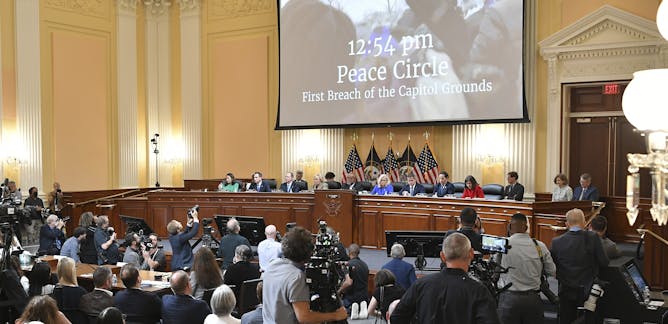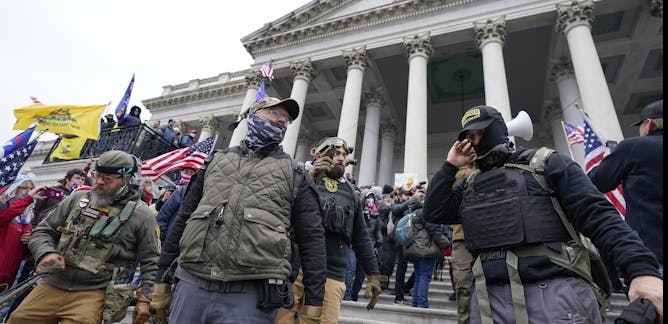|
The mission statement of The Conversation is both simple and ambitious: Share knowledge. Inform decisions. That mission is based on the assumption that reasonable people want to make informed decisions. Informed decisions are dependent on facts and trust. If you don’t trust the source, you won’t believe the facts. But what happens when you first decide you don’t like the facts and that, in turn, makes you distrust the source?
I’m not sure if you watched the live broadcast Thursday night of the U.S. Congressional Committee to Investigate the January 6 Attack on the United States Capitol. It was mesmerizing prime-time viewing in which Republican Liz Cheney laid out a compelling narrative based on facts revealed by the committee over many months of testimony. And yet while watching it, I kept wondering: will the facts matter to the millions of people who still believe Donald Trump won the 2020 presidential election?
Facts do matter. Facts show that placing restrictions on assault rifles means fewer mass shootings. Facts show that Russia based its invasion of Ukraine on a series of well-orchestrated lies. Facts show that the problem of inflation is complex and can’t be solved by demonizing a country’s central bank.
Real leaders tell people the facts they need to hear, not what they want to hear. And real media outlets should do the same thing. For your weekend reading, some important facts about the Jan. 6 hearings, gun control, Russian atrocities in Ukraine and inflation.
We’ll be back in your Inbox on Monday.
|
Weekend Reads: The problem with ignoring facts
|

Mark Satta, Wayne State University; Claire Leavitt, Grinnell College; Ken Hughes, University of Virginia
The House committee investigating the Jan. 6, 2021 attack on the US Capitol held its first hearing to present what it has learned during its almost year-long probe. Three scholars analyze the event.
| |

Claire Leavitt, Grinnell College
On the eve of public hearings held by Congress’ January 6 investigative committee, a former oversight staffer for the House of Representatives explains what such hearings aim to accomplish.
|

Matthew Valasik, University of Alabama; Shannon Reid, University of North Carolina – Charlotte
White supremacist groups seek to solidify their control over the US by changing the government, sometimes by violence.
| |

Matt Harris, Park University
The number of candidates running in party primaries has ballooned since 2010. That may result in extreme, inexperienced or controversial nominees who do not represent a majority of voters.
|

Emma Shortis, RMIT University
American institutions are seemingly powerless to enact gun reform because so many Americans believe – consciously or not – that any sacrifice is worth it to live in the best country in the world.
| |

Michael J. Klein, New York University
Analysis of the 10 years in which the US banned sales of assault weapons shows that it correlates with a drop in mass shooting deaths – a trend that reversed as soon as the ban expired.
|

Brendon O'Connor, University of Sydney; Daniel Cooper, Griffith University
Frequent mass shootings are a stain on the country’s international reputation. But it’s likely the latest episode will lead to more inaction on gun control.
| |

Robert Spitzer, State University of New York College at Cortland
The group, founded in 1871, didn’t try to smother virtually all gun control efforts until the mid-1970s.
|

David Roger Marples, University of Alberta
Ukraine is facing a struggle for survival. Its population could fall to 30 million by the time the war ends, with cities destroyed, crops expropriated and thousands already killed and wounded.
| |

Jacqueline Best, L’Université d’Ottawa/University of Ottawa
While central banks did help mitigate a COVID-induced recession, they don’t have the power to solve our inflation problem.
|
|
|

Vinita Srivastava, The Conversation
In today’s episode, we hear from two women who talk about how diamond mines in the Northwest Territories have negatively impacted women and girls and perpetuated gender violence.
|